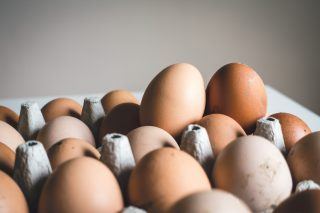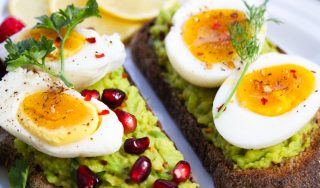Eggs are loved for their great taste, versatility, and for being a cost-effective meal option for any time of the day. Eggs are also nutritious: a source of protein and contain heart-healthy fats, with a host of minerals like iron and zinc, and vitamins A, B2, and B12. But there’s a less well-known nutrient in eggs that is deserving of some attention: choline.
What is choline?
Choline is a vitamin-like nutrient essential as part of a healthy and balanced diet. As part of all the body’s cell membranes, the body cells cannot function without choline. Choline is also a building block for the important neurotransmitter (brain chemical) called acetylcholine. This makes choline important for memory, mood, muscle control, and other brain and nervous system functions.

Photo by Jakub Kapusnak on Unsplash
Unfortunately, less than 1 in 10 people get enough choline (1). While our livers can produce some choline, it is too little to meet our daily needs which means choline needs to be eaten in the diet. Eggs are high in choline, with an impressive 147 mg per large egg. This is the same as about 27 % and 35 % of an adult man’s and women’s daily needs, respectively.
Why does the body need choline?
Choline is required for normal brain growth and development. This nutrient also participates in pathways that regulate genes related to memory and brain (cognitive) functions. For this reason, scientists think that choline may influence mental health and neurodegenerative diseases like Alzheimer’s disease (2).
Speaking of the brain, choline is essential for a baby’s brain development, too. A study from Cornell University found that babies of mothers who eat enough choline when pregnant reap brain and cognitive benefits. This is why the choline need for pregnant moms is higher, making well-cooked eggs a good food choice. Yet, despite these great benefits, it is concerning that 9 in 10 pregnant women consume too little choline.
Added to this, choline needs are 23 % higher in breastfeeding mothers. Choline is found naturally in large amounts in breast milk. Beyond infancy, young children also benefit from higher choline intake in the first two years of life.

Photo by Trang Doan from Pexels
Choline is good for adults, too. Scientists have found that choline may help in managing blood pressure, keeping the heart and its blood vessels healthy. A recent study published in Food & Function found that for every 100 mg increase in the amount of choline eaten, the risk of developing high blood pressure decreases by 16 %.
Getting choline into your body
It is always recommended to get choline from a balanced diet rather than take high-dose supplements. This is supported by studies that have shown that when choline is present in its natural form, like an egg, it is more efficiently absorbed compared to taking a supplement. Since one egg contains 147 mg of choline, this goes to show that adding eggs to your diet is important in managing high blood pressure, along with other lifestyle changes.
Studies have shown that egg-eating adults are more likely to meet their choline needs each day. Egg eaters also have almost double the intake of choline compared to non-egg eaters. Just eating the egg white though? Well, then you will not be getting in all the health benefits of choline, which is only found in the egg yolk.
So, if you’re looking to include more eggs in your diet, but have no idea where to start, then enjoy this delicious poached egg recipe.
POACHED EGG ON ROAST TOMATO SALAD
This warm egg salad, also known as Panzanella salad, is quick and easy to prepare and absolutely delicious with either poached or soft-boiled eggs.
Serves 6
Preparation time: 10 minutes
Cooking time: 40 Minutes
Ingredients
Day-old French loaf/ciabatta/sourdough, roughly ½ loaf
Approximately 600g cocktail tomatoes, halved
Sea salt and freshly ground black pepper, to taste
6 tablespoons (90ml) olive oil
4 tablespoons (60ml) red wine vinegar
4 garlic cloves, crushed

Poached Egg Salad
2 tablespoons capers, rinsed and roughly chopped (optional)
1 lemon, juiced
6 large fresh eggs
Handful of baby spinach leaves or micro salad greens to serve
10g fresh basil leaves, chopped
Basil pesto to drizzle on eggs (optional)
Parmesan shavings to garnish.
Method
- Preheat the oven to 180 °C.
- Tear the bread into chunky pieces, drizzle with 2 tablespoons olive oil, sprinkle with a few pinches of salt and a grind of black pepper and toss with the tomatoes.
- Place the bread and tomatoes onto a baking tray and drizzle over the remaining 4 tablespoons of olive oil. Bake for 35 minutes until the bread is golden.
- For the dressing: whisk the vinegar, garlic, capers, and lemon juice together.
- In a large bowl, toss the roast tomatoes and bread with the dressing mixture.
- Poach the eggs to your liking.
- To serve: Arrange the spinach leaves or microgreens on a platter, scatter the basil leaves on top, layer with the roast tomatoes and croutons, top with poached eggs, and drizzle with pesto.
- Scatter Parmesan shavings on top and serve straight away while warm.
Tip: When poaching eggs, add a tablespoon of white vinegar to the boiling water. Eggs love vinegar, as it helps to bind the protein in the egg. The same applies to boiled eggs, adding a teaspoon of vinegar to the water prevents the shells from cracking.
References
- Wallace TC, Fulgoni VL. Usual Choline Intakes Are Associated with Egg and Protein Food Consumption in the United States. Nutrients, 2017; 9, 839. doi:10.3390/nu9080839.
- Beckdash RA. Neuroprotective Effects of Choline and Other Methyl Donors. Nutrients. 2019; 11, 2995. doi:10.3390/nu11122995.
- Caudill MA, Strupp BJ, Muscalu L, Nevins JEH, Canfield, RL. Maternal choline supplementation during the third trimester of pregnancy improves infant information processing speed: a randomized, double-blind, controlled feeding study. The FASEB Journal. 2017. DOI: 10.1096/fj.201700692RR
- Chen MY, Northington R, Yan J. Choline Composition in Breast Milk–A Systematic Review and Meta-Analysis. FASEB Jourbal. 2017;31(S1):lb392-lb392.
- Derbyshire E, Obeid R. Choline, Neurological Development and Brain Function: A Systematic Review Focusing on the First 1000 Days. Nutrients. 2020;12(6):1731. https://doi.org/10.3390/nu12061731
- Golzarand M, Bahadoran Z, Mirmiran P, Azizi F. Dietary choline and betaine intake and risk of hypertension development: a 7.4-year follow-up. Food and Function. 2021;12(9):4072-4078.
- Smolders L, de Wit NJW, Balvers MGJ, Obeid R, Vissers MMM, Esser D. Natural Choline from Egg Yolk Phospholipids Is More Efficiently Absorbed Compared with Choline Bitartrate; Outcomes of A Randomized Trial in Healthy Adults. Nutrients. 2019;11(11):2758. doi: 10.3390/nu11112758





![women [longevity live]](https://longevitylive.com/wp-content/uploads/2020/01/photo-of-women-walking-down-the-street-1116984-100x100.jpg)









